
English_books / New Headway int sb
.pdf
READING AND LISTENING
Pre-reading task
1 In the 2nd century BC a list was made of the most impressive and beautiful man-made objects in the world. These were called The Seven Wonders of the World.
Match each picture in the box with its name. How many can we still see today?
The Pharos, lighthouse of Alexandria
The Hanging Gardens of Babylon
The Statue of Zeus at Olympia
The Colossus of Rhodes
The Pyramids of Egypt
The Tomb of Mausolus
The Temple of Diana
2"What do you think are some of the greatest wonders of the twentieth century? Don't just think of buildings!
Reading
1 In the text, the journalist, Ann Halliday, describes what are for her the seven wonders of the modern world. Read about them.
2In what way does she say modern wonders are different from ancient wonders?
Put them in order, 1 - 7. according to which you think is the most important (1 = the most important, 7 = the least important).
computers |
QJ space travel |
medical science |
|] holidays |
the Olympic Games |
Q agriculture |
we are still here |
|
Discuss your decisions as a class.
Wonders of th modern work
by Ann Halliday
I DON'T believe that today's wonders are similar in kind to the wonders of the Ancient World. They we all buildings and statues. In the last two centuries v have seen unprecedented technical and scientific achievements. These are surely our modern wonder Here is my list.
1 Computers
They have already revolutionized the way we live a work. But it is early days for computers. We don't know how much they are still changing the world. More computer wonders are yet to come.
2 Space Travel
Only a few years before men were walking on the me reputable scientists declared that it was impossible. ] in 1969 Neil Armstrong stepped out ofhis space cap; and made his famous statement: 'That's one small st for a man, one giant leap for mankind'.
3Medical Science
Surely nothing has done more for the comfort and happiness of mankind than the advance of medical knowledge! How many millions of people have benefited from the humble aspirin? How many live; has penicillin saved? Average life expectancy in Eur< has risen dramatically over the last hundred years, from about 50 years in 1906 to about 75 years today
10 Unit 1 What a wonderful world!
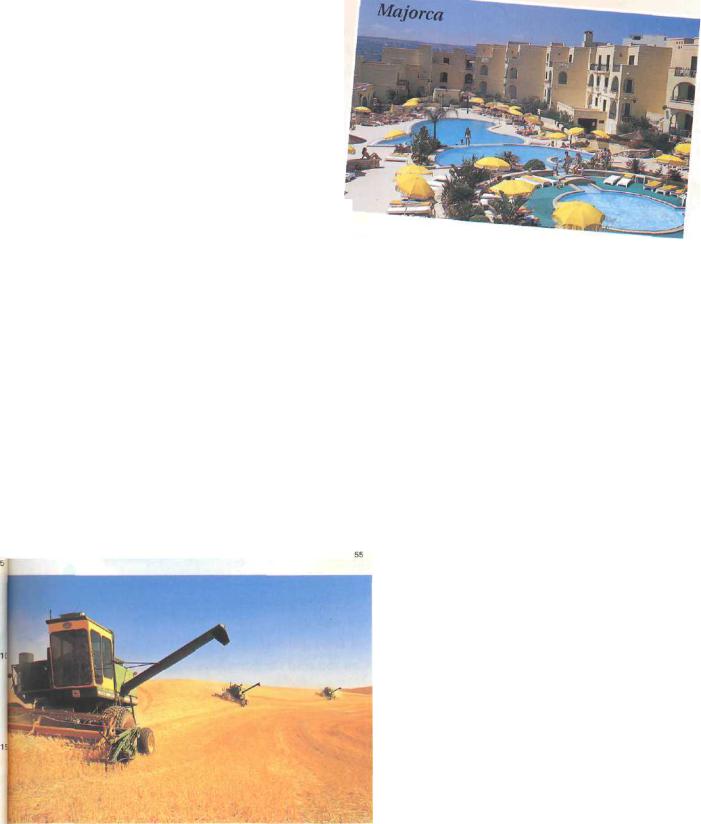
4 Holidays
Yes — holidays! In fact there have always been holidays — in ancient Rome there were more than 150 a year — but a holiday used to mean simply a day when you didn't work. Now holidaymakers travel to all parts of the world. Perhaps you don't like so many tourists in your country, but you must agree that a phenomenon which sees the population of Greece treble in summer, and which sends office workers and shop assistants
to Spain, Turkey, or the Caribbean is a wonder of the world.
5The Olympic Games
It is true that the Olympic Games are now commercialized and there is greed and drug abuse. However, it is a competition in which every country in the world takes part. Every four years, for a brief moment, we see these countries come together in peace and friendship. We feel hope again for the future of mankind.
6Agriculture
In 1724, Jonathan Swift wrote, 'Whoever makes two blades of grass or two ears of corn grow where only one grew before serves mankind better than the whole race of politicians'. In Europe our farmers have done this. In 1709, whole villages in France died of hunger. Now, in Europe we can't eat all the food we produce. If only the politicians could find a way to share it with those parts of the world where there is still famine.
We are still here
The last wonder of the modern world is simply that we are still here. We have bombs that could destroy the world but we have not used them. This is surely
the greatest wonder of all! |
60 |
Comprehension check
Here are seven more statements made by Ann about her choice of wonders. Which statement goes with which wonder? Discuss your answers with a partner.
aSurgeons can perform the most amazing operations.
bWe see people from warring countries shake hands,
cSmall children can program them, sometimes more easily than adults!
dNo government dares to use such weapons,
eMaybe visiting one country a day is not your idea of the best way to see the world!
fWe produce enough to feed the world.
gProgress in this area is slower now. Not as much money goes into research as in the 1960s.
Language work
Complete the following with the correct auxiliary verb in the positive or negative form. Check your answers with the text.
1 |
Computers |
|
|
|
|
already revolutionized the |
||||
|
way we live and work. |
|
|
|
||||||
2 We |
know how much they |
|||||||||
|
still changing the world. |
|
|
|
||||||
3 |
Only a few years before men |
|
|
walking |
||||||
|
on the moon, scientists said that it was impossible. |
|||||||||
4 |
How many lives |
|
. |
|
|
penicillin saved? |
||||
|
|
|
|
|
|
|
|
|||
5 A holiday used to mean a day when you |
||||||||||
|
|
|
|
work. |
|
|
|
|||
6 |
The Olympic Games |
|
now |
|||||||
|
commercialized. |
|
|
|
|
|
|
|
||
Listening
T.6 You will hear three people giving their ideas of the wonders of the modern world.
-Make a list of the wonders they mention.
-What is good about each wonder?
-Are there any problems with it?
What a wonderful world! Unit 1 11
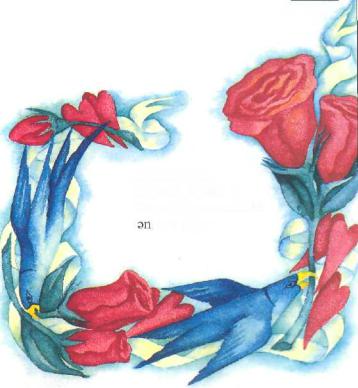
SPEAKING
Discussion
1 What machines are important in your life? In pairs, put the inventions in order. Which do you think is the most important? Which has changed the world the most? Mark them 1 for the most important down to 10 for the least important.
the telephone |
the atom bomb |
the car |
the space rocket |
the television |
the computer |
the plane |
the fax machine |
the space satellite |
the washing |
|
machine |
2Work in groups of four. Try to persuade the others that your order is the right one!
3Talk together as a class. What other machines would you add to the list?
VOCABULARY AND PRONUNCIATION
Sounds and spelling
1 English spelling, as you probably know, is not logical! Words which look as though they are pronounced the same aren't pronounced the same.
meat imv.tl and great /greit/ home /haurn/ and some /sAm/ know /nsu/ and now /nau/
2In the following lists of words, three words rhyme, but one is different. Underline the one that's different. The two vowel sounds are given to help you. There is a list of phonetic symbols on the inside back cover of this book.
|
Example |
|
|
|
|
/u:/ or lull |
|
|
|
|
boot |
foot |
shoot |
suit |
a |
I'd or /e/? |
|
|
|
|
bread |
head |
read (past) |
read (present) |
b |
/3:/or/o:/? |
|
|
|
|
work |
fork |
talk |
walk |
c |
/A/ or hull |
|
|
|
|
done |
phone |
son |
won |
d Id or hill |
|
|
|
|
|
paid |
made |
played |
said |
c |
/u:/ or /u7? |
|
|
|
|
good |
food |
wood |
stood |
f |
/ei/ or lv.ll |
|
|
|
|
ache |
break |
take |
weak |
g |
/is/ or /es/? |
|
|
|
|
dear |
hear |
pear |
near |
h |
hul or |
/au/? |
|
rose |
|
cows |
knows |
owes |
|
T.7 Listen and check your answers.
Silent letters
1 There are many silent letters in English words.
lis/en |
ta/k |
^rite |
j^nife |
Cross out the silent letters in the following words,
a |
sign |
e |
receipt |
i |
salmon |
b |
honest |
f |
knee |
j |
cupboard |
c |
half |
g |
iron |
k |
whistle |
d |
comb |
h |
lamb |
1 |
answer |
2Here are some words in phonetics. Write the words. Careful! They all have silent letters.
Example /klaimd/ = climbed
a |
/'ka:sl/ |
|
|
f |
/'foran/ |
|||
b |
/bom/ |
|
|
g |
/ha:t/ |
|||
|
|
|
|
|
|
|
|
|
|
|
|
|
|
h |
|
|
|
d |
/'aibnd/ |
|
|
|
|
|
||
e |
/nok/ |
|
|
j |
/'grsenma:/ |
|||
T.8 Listen and check your answers.
Love poem!
Can you read the poem?
rsuziz 3 red 5a skai iz blu:
5a w3:ld iz WAndsfol sau a ju:
12 Unit 1 What a wonderful world!
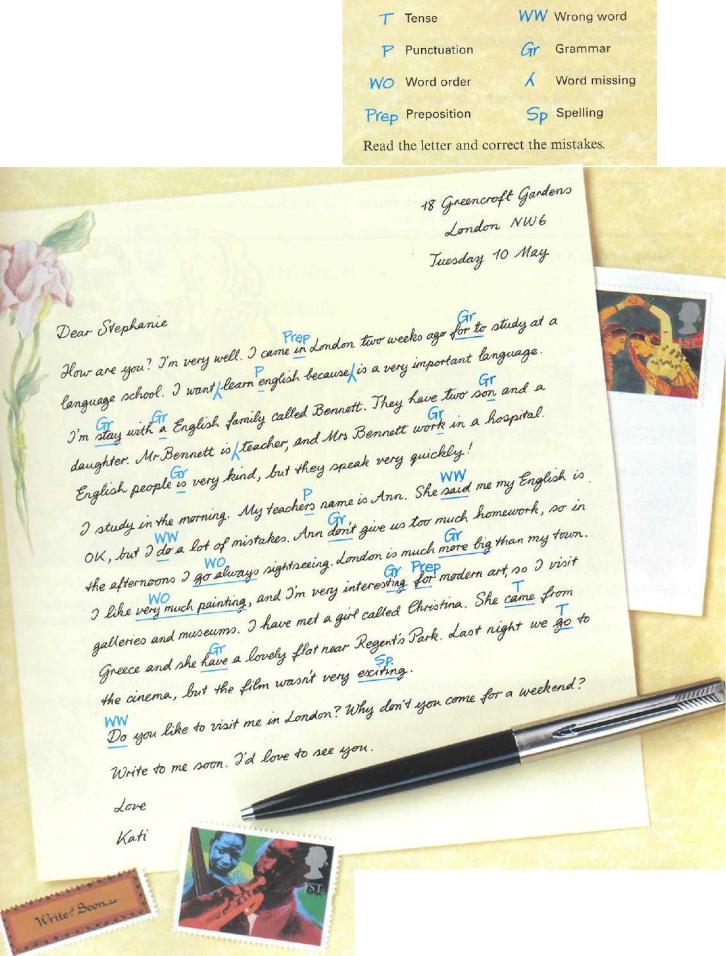
WRITING
Correcting mistakes
1 It is important to try to correct your own mistakes when you write. Look at the letter that a student has written to her friend. Her teacher has used symbols to show her the kind of mistakes she has made.
2 Write a similar letter. Imagine you are a student (of languages? of art? of music?) in another town. Write a letter to a friend giving some of your news.
What a wonderful world! Unit 1 13

Social expressions
1 When we're talking and chatting, we use a lot of idiomatic expressions!
Example
|
Hurry up, we're late! |
|
|
|
Hang on a sec. I'm just |
|
|
going to the loo. |
|
Match a line in A with a line in B. |
|
a |
e |
i |
b |
f |
j |
c |
g |
k |
d |
h |
|
aSorry I'm late. I got held up in the traffic.
bBye, Mum! I'm off to school now.
cHave you heard that Jenny's going out with Pete Boyd?
dHow long did it take you to do the homework?
eI don't know about you, but I'm fed up with this weather.
fWho was that I saw you with last night?
gI'm tired. I'm having next week off.
h |
Right! Let's go for a ten-mile jog in the park! |
i Let me buy you a drink. |
|
j Shall we meet this afternoon at 3.00? |
|
k |
What a fantastic coat! Was it expensive? |
B
1 No, no. It's my round. What would you like?
2That's a good idea. The break will do you good.
3Me, too. I'm just longing for some sunshine.
4Never mind. You're here now. Come and sit down. 5 Ages. What about you?
6 It cost an absolute fortune!
7 Really? I don't know what she sees in him.
8 Sorry. I can't make it then. What about a bit later? 9 Take care, my love. Have a nice day!
10You must be joking!
11Mind your own business!
2 |
T.9a |
Listen and check your answers. Memorize |
|
some of the dialogues. Close your books and practi |
|
|
them in pairs. |
|
3 |
T,9b |
Listen to the sentences. Reply, using one of |
lines in column B. You will have to change some of them a little.
4 Choose some of the dialogues and continue them.
Example
AWhat afantastic coat! Was it expensive?
BIt cost an absolutefortune. But the material's beautiful, and it's got a silk lining.
AWhere did you get it?
B/ saw ii in the window of that new shop in town;
you know, it's called 'Chic'.
AYes, I know it. They have some lovely stuff don't they?
14 Unit 1 What a wonderful world!
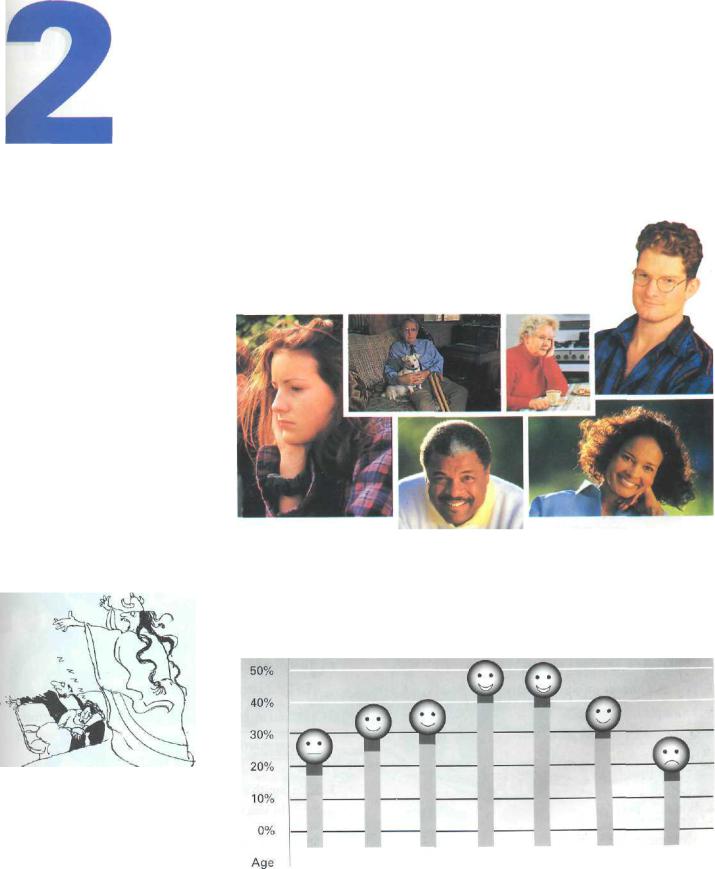
Happiness!
Present states and actions Active and passive Numbers
Test your grammar
Look at the pairs of sentences. Which one is correct? Why?
1 She speaks five languages. She's speaking five languages.
2Look at that man! He wears such a funny hat.
Look at that man! He's wearing such a funny hat.
3Don't take that book back to the library. I'm reading it.
Don't take that book back to the library. I read it.
4They have two daughters and two sons.
They're having two daughters and two sons.
5Do you understand Spanish? Are you understanding Spanish?
PRESENTATION (1)
Present Simple
1 What do you think is the happiest time of a person's life: when you are a child or an adult?
2A market research organization did a survey to find out who are the happiest people in Britain! They interviewed over 5,000 people.
Here are the results of the survey. At what time in their lives are British people happiest? When are they least happy? Why do you think this is?
The best years of our lives
6We're thinking opera is boring. We think opera is boring.
7English speaks all over the world. English is spoken all over the
world. |
15-19 |
20-24 |
25-34 |
35-44 |
45-54 |
55-64 |
65+ |
Happiness! Unit 2 15
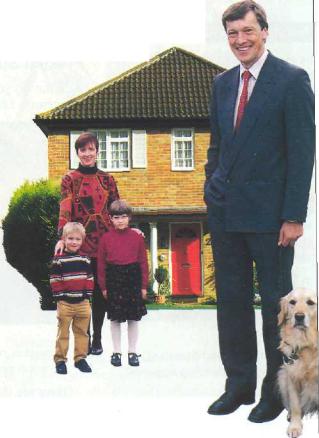
3 T. 10 Read and listen to the text.
The happiest person
The happiest person in Britain today is a in Britain professional married man between the ages of 35
and 54. He lives in the south of England but not in London. He owns a comfortable, detached house and has two children.
What does he do? |
Mr Happy! |
He has a steady job in an office in London. After a |
|
hard day at work, he relaxes in front of the television |
John Smith aged 45 |
or watches a video. He doesn't go out every evening, |
an accountant |
but two evenings a week he meets friends for a drink |
from Surrey |
in the local pub. He owns a pet, usually a dog, and |
|
takes it for a walk every day after work. He spends on |
|
average £120 per week. |
|
Where does he go? |
|
At the weekend, he regularly eats in restaurants, goes |
|
to see shows, and plays a sport (usually golf). Most |
|
weekends he puts on a pair of old blue jeans, and |
|
potters in the garden. He usually goes on holiday |
|
abroad more than once a year. |
|
What does his wife do? |
|
His wife is happy, too, but not quite as happy. She runs |
|
the home and has a job, but she doesn't earn as much |
|
as her husband. |
|
•Grammar questions
-What tense are all the verbs in italics'? Why?
-Why do the verbs in the text end in -si
-Which auxiliary verb is used to form questions and negatives in the Present Simple?
PRACTICE
Speaking
1 Ask and answer questions about John Smith.
Example
... married?
eHow much ... per week?
fWhat... do at the weekend?
gHow often ... holiday abroad?
T.11 Listen and check your answers.
2 Ask and answer the same questions with a partner.
|
Is he married? |
|
Are you married? V |
||||||
|
|
|
|
|
|
|
|
|
|
|
|
|
|
— |
|
" ~ ^ ^ N o , I'm not. |
|||
|
•^/ Yes, he is. |
|
|
|
|
||||
|
3 John Smith's lifestyle doesn't seem very exciting. |
||||||||
a |
Where ... live? |
-- |
|
Why do you think he is so happy? |
|||||
b |
What... do? |
- |
Why is his wife less happy? |
||||||
c |
How many children ...? |
- |
Do you think men are generally happier than wome |
||||||
d |
How ... relax after work? |
|
|
in your country? |
|||||
16 Unit 2 Happiness!
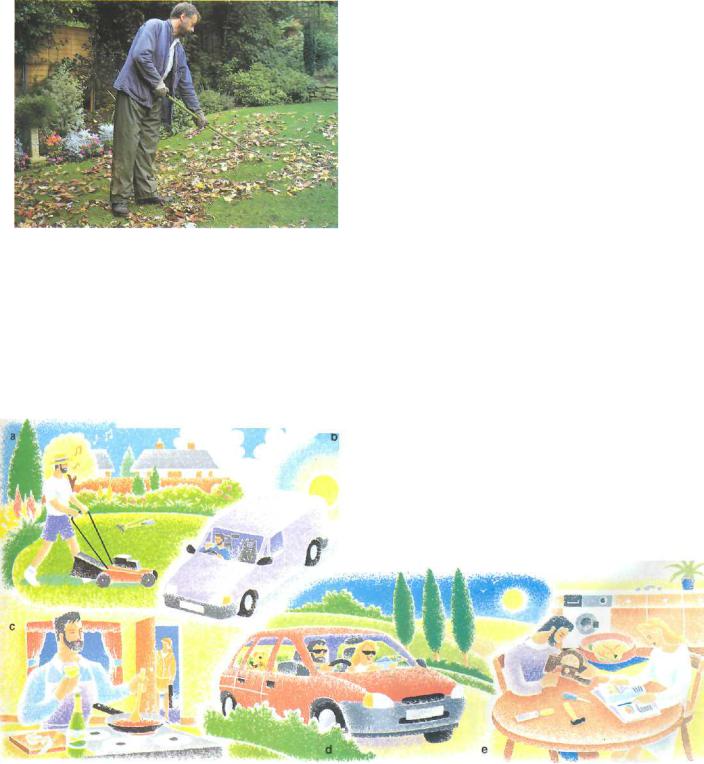
PRESENTATION (2)
Present Simple and Present Continuous Active and passive
1 T.I2 Look at the photograph of Roger Dromard. also aged 45, and listen to him talking about himself. Answer the questions.
What's the best thing that ever happened to him? What was his job before? What does he do now? Where does he live?
Is he married?
What does Fiona do? Does Roger earn more than Fiona?
What is Roger's hobby? What is Fiona's hobby? Does Roger play any sports?
Are there any problems with his job? Does he often eat out in restaurants?
Is Roger's life like John Smith's? Is he happy?
0 ***
2 Listen again. Complete the sentences with the exact
|
words Roger uses. |
|
||||||||||||||
a |
In summer I usually |
home at about |
||||||||||||||
|
5.30 in the morning. |
|
||||||||||||||
b |
I |
|
|
a small van, and I |
all |
|||||||||||
|
my tools and equipment in that. |
|
||||||||||||||
c |
It's autumn now so I _^_____ |
the gardens and |
||||||||||||||
|
|
|
|
|
|
|
|
|
|
|
leaves. |
|
||||
d |
I |
|
|
|
lots of daffodils and tulips. |
|||||||||||
e |
After work I always |
home and |
||||||||||||||
|
|
|
|
|
|
|
|
|
|
|
|
|
|
|
|
|
|
|
|
|
|
|
|
|
|
|
|
in a hot bath. |
|
||||
f |
I usually |
|
|
|
|
|
|
our evening meal because she |
||||||||
|
(Fiona) |
|
|
|
|
|
home from work after me. |
|||||||||
g |
At weekends we often |
into the country |
||||||||||||||
|
and |
|
|
|
to antique shops and antique sales, |
|||||||||||
h We |
|
|
a television! Everybody |
|||||||||||||
|
|
|
|
|
|
|
|
|
|
|
one these days but we |
|||||
i |
I |
_ old radios and Fiona |
||||||||||||||
|
old cookery books. |
|
||||||||||||||
j |
I've just bought two 1930s radios and I |
|||||||||||||||
|
them and |
|
|
|
|
_ them. |
|
|||||||||
|
|
|
|
|
|
|
|
|
|
|
|
|||||
k |
I never |
|
|
|
|
|
|
any sports. |
|
|||||||
1 |
I |
_ much in autumn and winter so I |
||||||||||||||
|
|
|
|
|
|
|
|
|
|
|
much at the moment. |
|||||
Grammar questions
-What tense are the verbs in sentences a and b? Why? Find some more examples of this tense.
-What tense are the verbs which complete sentence c? Why? Find some more examples.
-What part of speech are the words in italics1} Which tense do they (nearly always) go with?
3 Look at the pictures. Describe what's happening.
Example
Roger's cutting the grass. He's wearing shorts.
Happiness! Unit 2 17
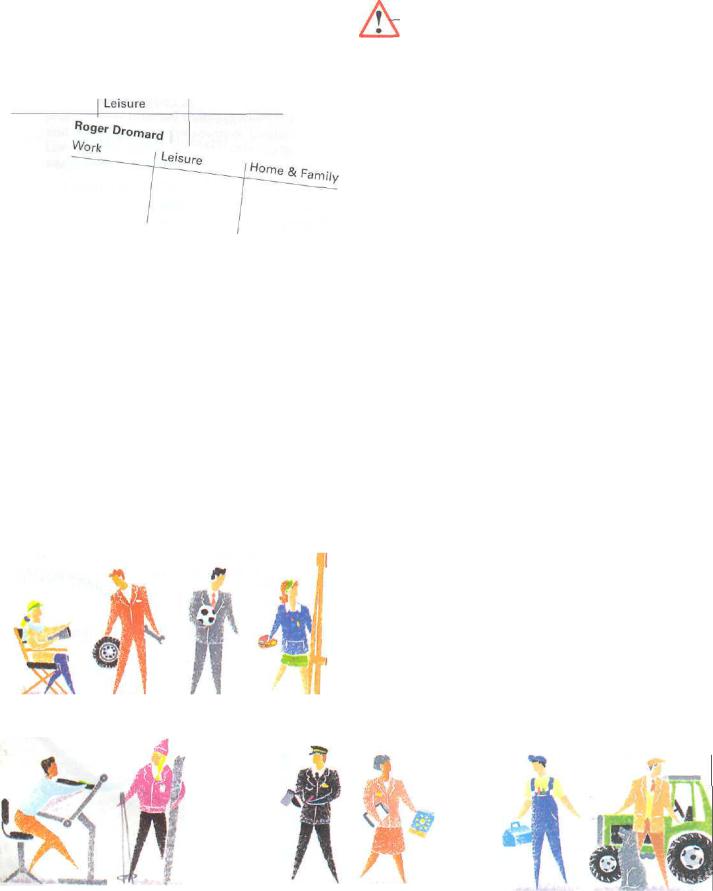
PRACTICE
1 Note-taking and speaking
Write notes about John Smith and Roger Dromard under the headings.
John Smith
Work |
Home & Family |
Talk to a partner. How many similarities and differences can you find?
2 Dialogues
1 T.13 Read and listen to the dialogue. Then work in pairs, and read and memorize it.
AWhat do you do?
BI'm an interior designer. T decorate people's houses, and give them ideas for furniture and lighting.
AAnd what are you doing at the moment?
BWell, I'm not working on a house. I'm working on a hotel. I'm designing a new dining-room for the Hilton.
2Work in pairs. Make up similar dialogues with some of the jobs below.
3Ask each other about your own jobs or studies.
a film director a mechanic a football manager an artist
L
3 Discussing grammar
Action and state verbs
1 Some verbs are used in both simple and continuous tenses.
She usually drives to work but today she isn't driving, she's walking.
These are called action verbs.
2Some verbs are not usually used in the continuous tenses. These are called state verbs.
/ like black coffee.
(NOT *l'm liking black coffee.)
Do you know the answer?
(NOT * Are you knowing the answer?)
Work in pairs and discuss your answers.
I Ten of the verbs in the box are not usually used in tl| Present Continuous.
Underline them.
go understand believe like agree enjoy
cost want |
listen to |
think (= opinion) |
mean know play love tell
2 Put a tick (/) if the sentence is right and a cross (X) it is wrong. Correct the mistakes.
Example
I don't understand English newspapers. / What are you wanting to drink? X
What do you want to drink?
aJim isn't wanting an ice-cream. He doesn't like it.
bWe're enjoying the course very much. We're learning a lot.
cI'm understanding you but I'm not agreeing with yoj
dDo you think that Vanessa plays golf well?
c I'm sorry. I'm not knowing the answer,
fI'm not believing you. You're telling lies,
gThey know the car costs a lot of money but they waj to buy it.
hShe listens to a French song but she doesn't understand what it is meaning.
an architect |
a ski instructor a journalist a traffic warden a travel agent an actor |
a plumber |
a farmer |
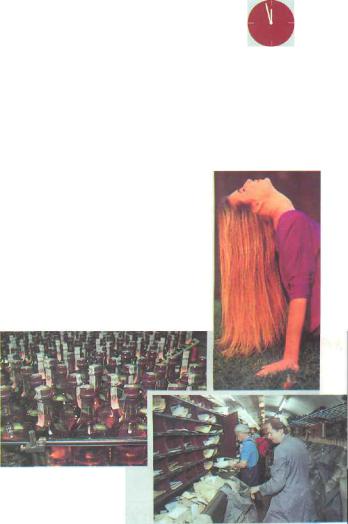
3 |
Complete the following pairs of sentences using the |
|
|
verb in italics. Use the Present Simple for one and the |
|
|
Present Continuous for the other. |
|
a |
come |
|
|
Alec and Mary are Scottish. They |
|
|
from Glasgow. |
|
|
They'll be here very soon. They __ |
by |
|
car. |
|
bhave
Lisa can't answer the phone. She bath.
|
She |
|
|
|
two new pairs of jeans. |
||||||||
cthink |
|
|
|
|
|
|
|
|
|||||
|
I |
|
|
that all politicians tell lies. |
|||||||||
|
I |
about my girlfriend. She's in New |
|||||||||||
|
York at the moment. |
|
|
||||||||||
dnotenjoy |
|
|
|
|
|
|
|
|
|||||
|
We__„ |
|
|
|
this party at all. The music is too |
||||||||
|
loud. |
|
|
|
|
|
|
|
|
||||
|
We |
|
|
going to big parties. |
|||||||||
e |
watch |
|
|
|
|
|
|
|
|
||||
|
Bequiet! I |
|
|
|
|
|
my favourite programme. |
||||||
|
I always „ |
|
|
|
|
it on Thursday evenings. |
|||||||
f see |
|
|
|
|
|
|
|
|
|||||
|
John's not at home. He |
|
the doctor |
||||||||||
|
about his sore throat. |
|
|
||||||||||
|
I |
|
the problem but T can't help you. |
||||||||||
|
Sorry. |
|
|
|
|
|
|
|
|
||||
g |
smell |
|
|
|
|
|
|
|
|
||||
|
Mmramm! Dinner |
|
good. What is it? |
||||||||||
|
Why |
|
|
|
_ you |
|
|
those roses? |
|||||
|
They're plastic! |
|
|
|
|
|
|
|
|
||||
h use (Careful!) |
|
|
|
|
|
|
|
|
|||||
|
This room |
|
|
|
|
|
usually |
|
for |
||||
|
big meetings. But today it |
|
for a party. |
||||||||||
4 Present Simple active or passive?
1 Which of the sentences are active and which are passive?
aI use this room as a study.
bThis room is used for meetings.
cWe feed our cats twice a day.
dBut the dogs are fed just once a day.
2 One hour is 60 minutes, which is 3,600 seconds. A lot can happen in that time!
Read about some of the things that happen all over the world. Put the verb in brackets into either Present Simple or Present Simple passive.
Example |
|
|
Every hour the planet Earth |
travels |
(travel) |
66,620 miles around the sun. |
|
|
Eleven earthquakes are felt |
(feel) somewhere in |
|
the world. |
|
|
Look at what happens in just 60 minutes!
1 |
The world's population |
(grow) by 9,300. |
|||
2 |
£75 million |
|
(spend) on all kinds of |
||
|
weapons. |
|
|||
3 |
Your heart |
(beat) 4,800 times. |
|||
4 |
Your hair _ |
_ (grow) |
|||
|
0.18796 mm. |
|
|||
5 |
12,540,000 cans of Coca-Cola |
||||
|
|
|
|
(drink). |
|
6 |
916,500 McDonald's hamburgers |
||||
|
|
|
|
(eat). |
|
7 |
17,465 bottles of whisky |
||||
|
|
|
|
(produce) in Scotland. |
|
8 |
1,426,940 letters |
|
|
|
|||||
|
|
|
|
(send). |
|
|
|
||
9 |
The Pentagon in |
|
|
|
|||||
|
Washington |
|
|
(receive) 8,300 telephone calls. |
|||||
10 |
£558,000 worth of goods _______ |
(sell) in |
|||||||
|
Harrods department store. |
|
|||||||
11 |
12,000 passengers |
|
|
(pass) through |
|||||
|
Heathrow airport. |
|
|
|
|||||
12 |
166 Volkswagen cars |
|
_ |
(make) in Germany. |
|||||
Happiness! Unit 2 19
